Top 15 Best Musical Movies of All Time
What are the most popular musicals? The movie musical is an entertainment staple that has transcended generations. While not every film in this genre becomes a classic (sorry, Cats) there are many musicals with legacies that continue to live on in the hearts of viewers. Because of this, we thought it was time to look at the best musicals of all time.
If there's one thing that's essential for a rainy day, it's a truly great musical film — after all, who can resist a catchy, melodic tune and some dazzling dance numbers? Since song and dance first hit the silver screen with the invention of sound technology in the 1920s, musical movies have long been a historical part of cinema — and have even seen a comeback in recent years, particularly with the rising popularity of music biopics, stage-to-screen adaptations, and live-action films.
1. The Sound of Music (1965)
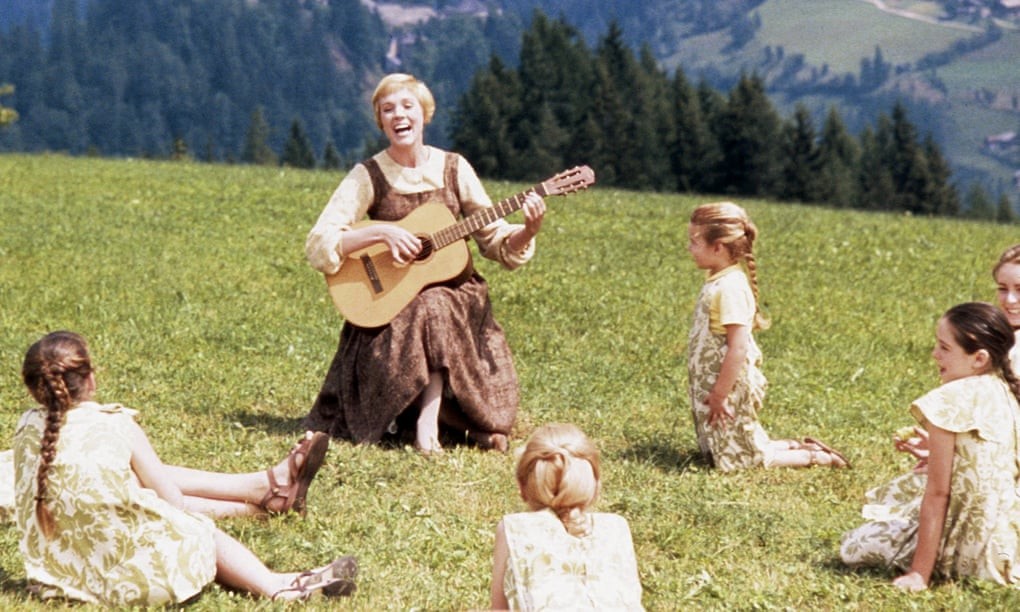 |
| The Sound of Music. Photograph: Allstar/20th Century Fox |
Imdb score: 8/10
The comic Katherine Ryan recalled that she once had a much younger boyfriend who asked if it was true that the movie Titanic was based on a true story. The same incredulity almost applies to The Sound of Music, based on the true story of the Von Trapp Family Singers, who toured a good deal in the late 1930s and finally left Austria for America quite openly.
The movie version was adapted from the Rodgers and Hammerstein stage musical, itself inspired by the 1956 German film Die Trapp Familie, whose screenwriter George Hurdalek created this essential romance, and is credited here. His story has a kind of transcendent, mythic status, over and above anything that might have happened in actuality. And it often does seem to challenge expectations.
Julie Andrews is Maria, first seen singing and spinning, arms spread wide, on the Untersberg near Salzburg. She is the headstrong novitiate whose childlike impulsiveness is looked on with kindly indulgence by the wise old Mother Abbess (Peggy Wood). The Abbess is to lead the classic number How Do You Solve a Problem Like Maria? The answer to that question is tacitly provided by the fact that it is reprised as Maria walks up the aisle on her wedding day. The implication is indelicate.
The Mother tells Maria that she is to take a job (salary not discussed) with a grumpy and yet swoon-worthily handsome widower, decorated naval officer Captain Von Trapp, who has seven children and orders them about with his bosun’s whistle. In this role, Plummer wears a chi-chi tailored suit that doesn’t look very 1930s: it’s the sort of outfit Brian Epstein would have bought for one of his clients from a shop in Carnaby Street.
Maria teaches the children to sing and of course falls in love with their father. Bad news for the elegant and worldly Baroness (Eleanor Parker) with whom the Captain had an understanding, but good news for their amusing friend, the dapper, cynical bohemian Max Detweiler (Richard Haydn), a music promoter who wishes to sign up the whole family as an adorable singing act.
2. La La Land (2016)
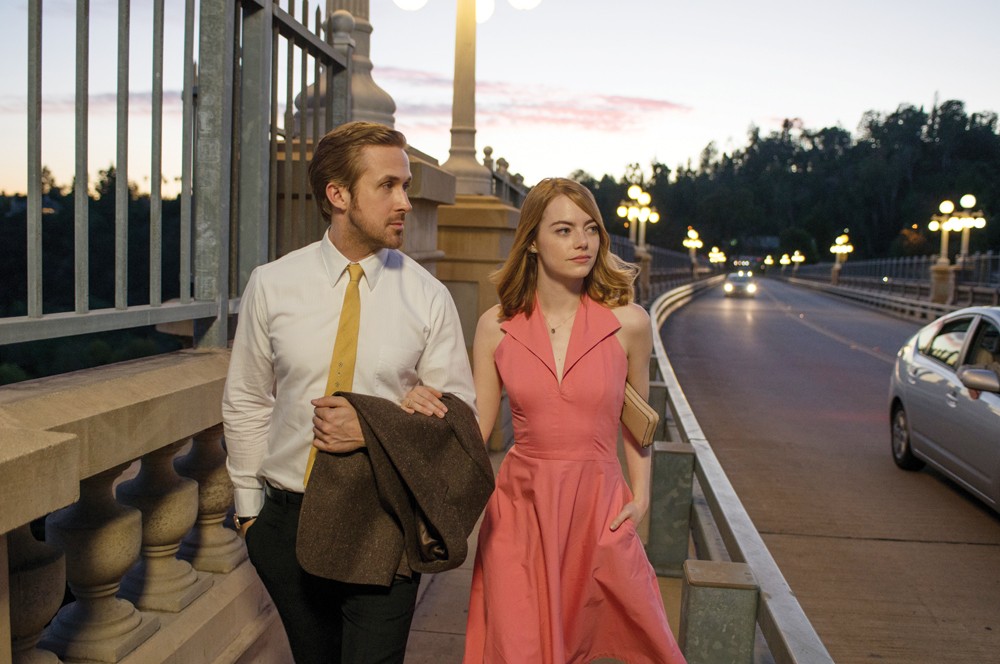 |
| Photo: Lionsgate |
Imdb score: 8/10
One of many remarkable things about Damien Chazelle’s “La La Land” is how much energy and time it devotes to movement and music, not just lyrics. The modern movie musicals, so often based on Broadway shows, have focused heavily on songs that further plot. In Chazelle’s vision, choreography matters and a simple piano refrain can have more power than a lyric. This is a beautiful film about love and dreams, and how the two impact each other. Los Angeles is filled with dreamers, and sometimes it takes a partner to make your dream come true.
“La La Land” opens with a bit of a fake-out in that it’s a large ensemble number of a variety that we won’t really see again in the movie. Cars are stuck in the notoriously awful L.A. traffic when the drivers decide to break into song called “Another Day of Sun”—a bit about how each day brings new hope for these young wannabe artists—jumping out of the cars and dancing on the freeway. Instantly, Chazelle’s direction and the dance choreography feels different. Here, and throughout the film, he works in long, unbroken takes. You can not only see the dance moves, but you can see the dancer’s entire body when he or she performs them. And after the chorus-like introduction to a city of dreamers, we meet two such sun-gazers: pianist Sebastian (Ryan Gosling) and actress Mia (Emma Stone). Like any good musical, the two have a few false starts and playfully mock each other’s flaws in their first scenes. But we know where this is headed and Gosling & Stone have the chemistry to make us long for them to get together.
3. Les Misérables (2012)
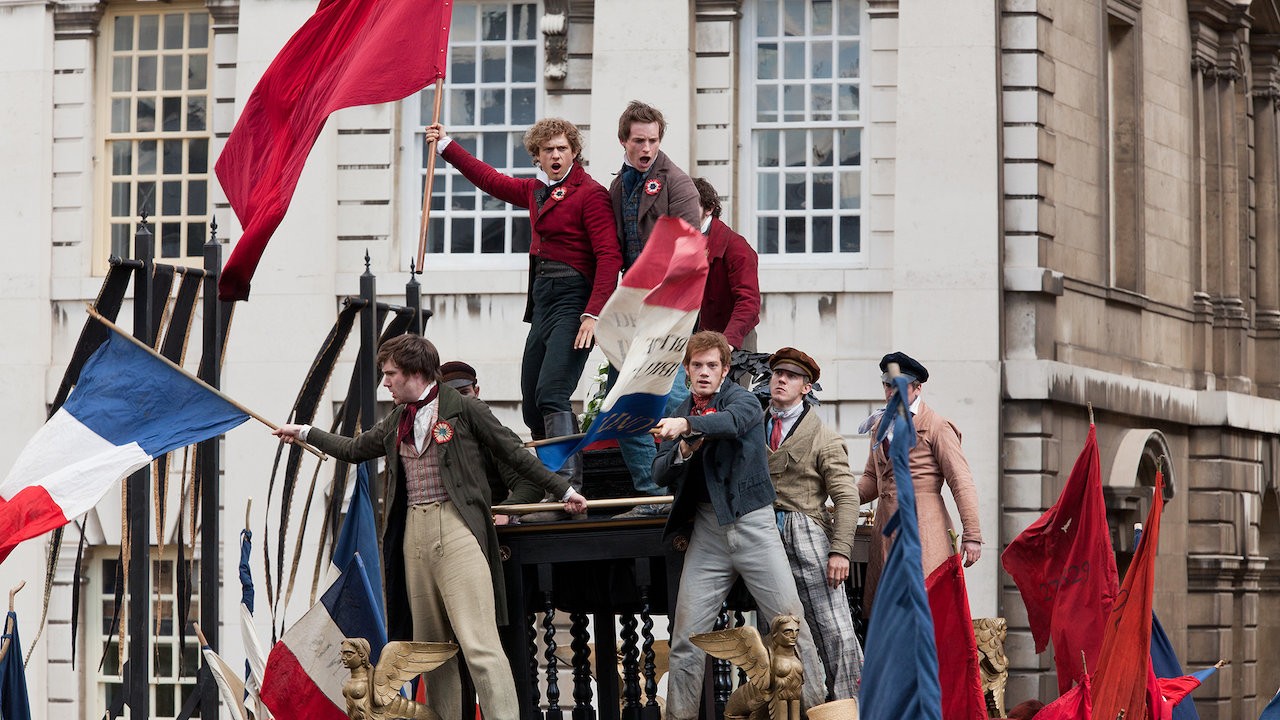 |
| Photo: Netflix |
Imdb score: 7.6/10
Les Misérables tells the story of Valjean (Jackman), a proud and decent man imprisoned for stealing bread to save his sister's family from starving. Once released, he is viciously pursued by police officer Javert (Crowe) for breaking the terms of his parole, but makes a Hardyesque career leap into respectability, becoming a mayor and factory owner. His path crosses that of his poor employee Fantine (Anne Hathaway) whose grownup daughter Cosette (Amanda Seyfried) is to fall fatefully in love with revolutionary firebrand Marius (Eddie Redmayne) just as Paris erupts in violence, and as Valjean must make his final reckoning with Javert.
It conquers its audience with weapons all its own: not passion so much as passionate sincerity, not power so much as overwhelming force. Every line, every note, every scene is belted out with diaphragm-quivering conviction and unbroken, unremitting intensity. The physical strength of this movie is impressive: an awe-inspiring and colossal effort, just like Valjean's as he lifts the flagpole at the beginning of the film. You can almost see the movie's muscles flexing and the veins standing out like whipcords on its forehead. At the end of 158 minutes, you really have experienced something. What exactly, I'm still not sure. But just as the inquisition got Galileo to recant just by showing him the instruments of torture, I felt that Hooper had stepped from the unparted curtains before the feature began, fixed my gaze, pointed at a large wringer he had brought on stage and said: "Whinge all you want. You're going through this."
4. My Fair Lady (1964)
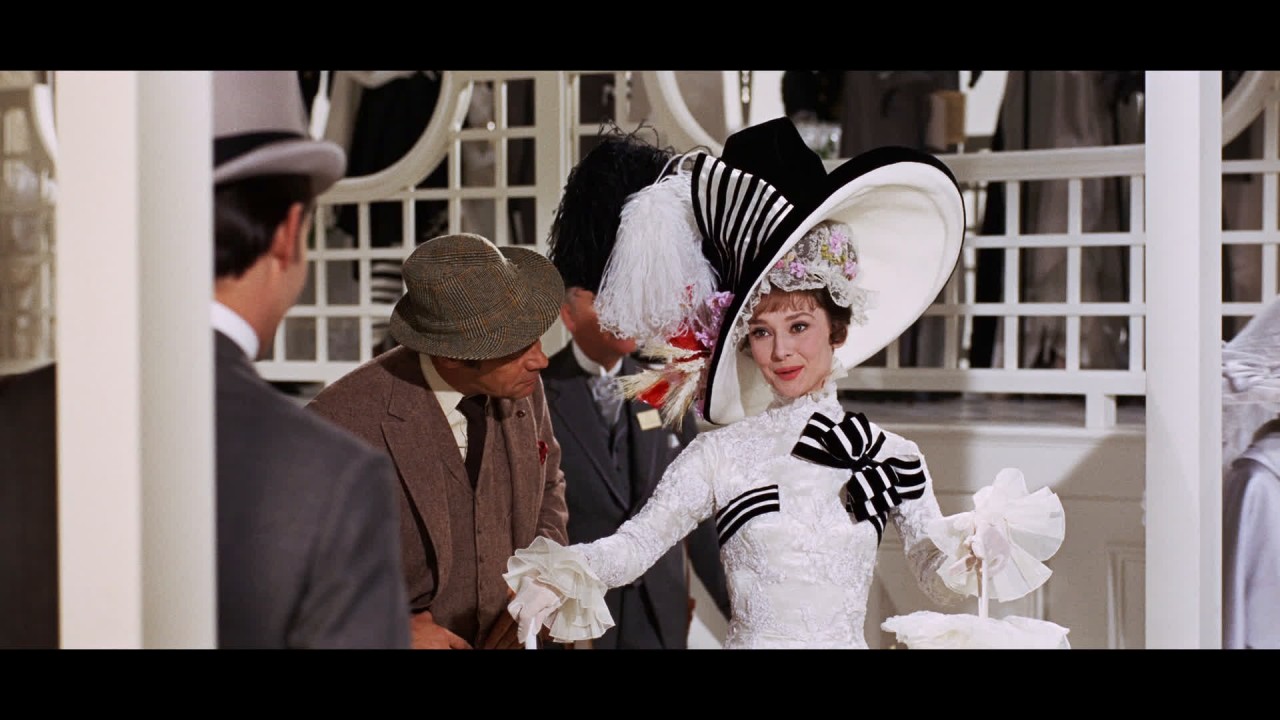 |
| Photo: Imdb |
Imdb score: 7.8/10
My Fair Lady is a 1964 American musical comedy-drama film adapted from the 1956 Lerner and Loewe stage musical based on George Bernard Shaw's 1913 stage play Pygmalion. With a screenplay by Alan Jay Lerner and directed by George Cukor, the film depicts a poor Cockney flower-seller named Eliza Doolittle who overhears an arrogant phonetics professor, Henry Higgins, as he casually wagers that he could teach her to speak "proper" English, thereby making her presentable in the high society of Edwardian London.
The film stars Audrey Hepburn as Eliza Doolittle and Rex Harrison as Henry Higgins, with Stanley Holloway, Gladys Cooper and Wilfrid Hyde-White in supporting roles. A critical and commercial success, it became the second highest-grossing film of 1964 and won eight Academy Awards, including Best Picture, Best Actor, and Best Director. In 1998, the American Film Institute named it the 91st greatest American film of all time. In 2006 it was ranked eighth in the AFI's Greatest Movie Musicals list.
In 2018, the film was selected for preservation in the United States National Film Registry by the Library of Congress as being "culturally, historically, or aesthetically significant."
5. Mary Poppins (1964)
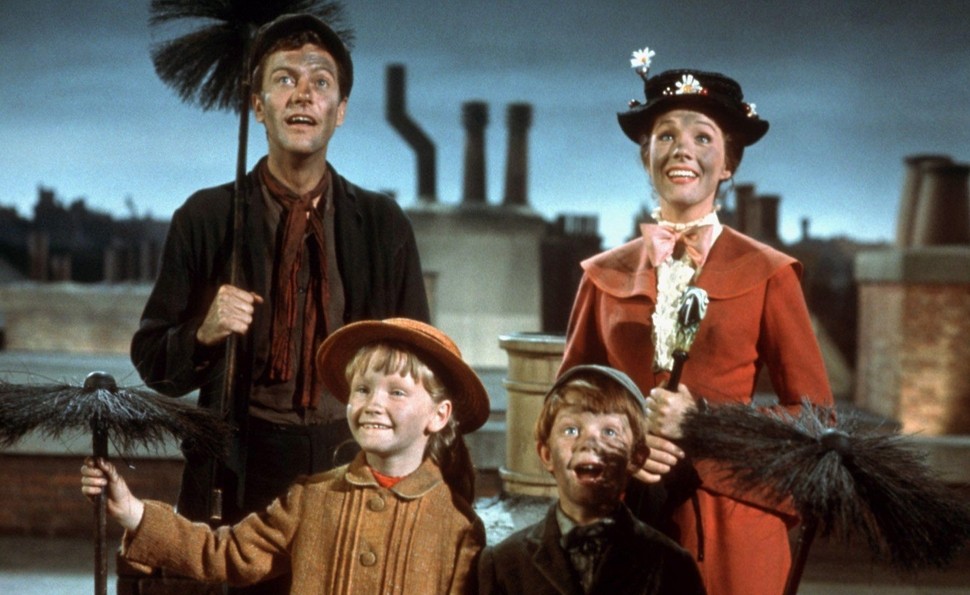 |
| Photo: Disney |
Imdb score: 7.8/10
In 1910 Britain, a British family seeks a new nanny for young Jane and Michael, and in flies magical MARY POPPINS (Julie Andrews, in an Oscar-winning performance). She's not at all what proper Mr. Banks was looking for, but precisely what the children ordered! Mary takes control and takes the children on glorious adventures. The kids also frolic with Bert (Dick Van Dyke), a one-man-band, sidewalk artist, and chimney sweep. Wonderful singing, dancing, and animation bring the story to life as somehow this unusual nanny helps Mr. Banks show love to his children, and the whole family appreciate each other all the more.
Rarely does a movie manage to be so much fun while delivering a simple, heartwarming story. While songs in today's Disney's musicals, though sometimes good, only serve to explain the characters' emotions or intentions, the best songs in Mary Poppins use the feelings of the characters as starting points from which to take off and explore, often in wildly whimsical directions.
The story follows suit, using small plot events to take viewers to many unexpected places. The end result is one of the all-time great family movies.
6. All That Jazz (1979)
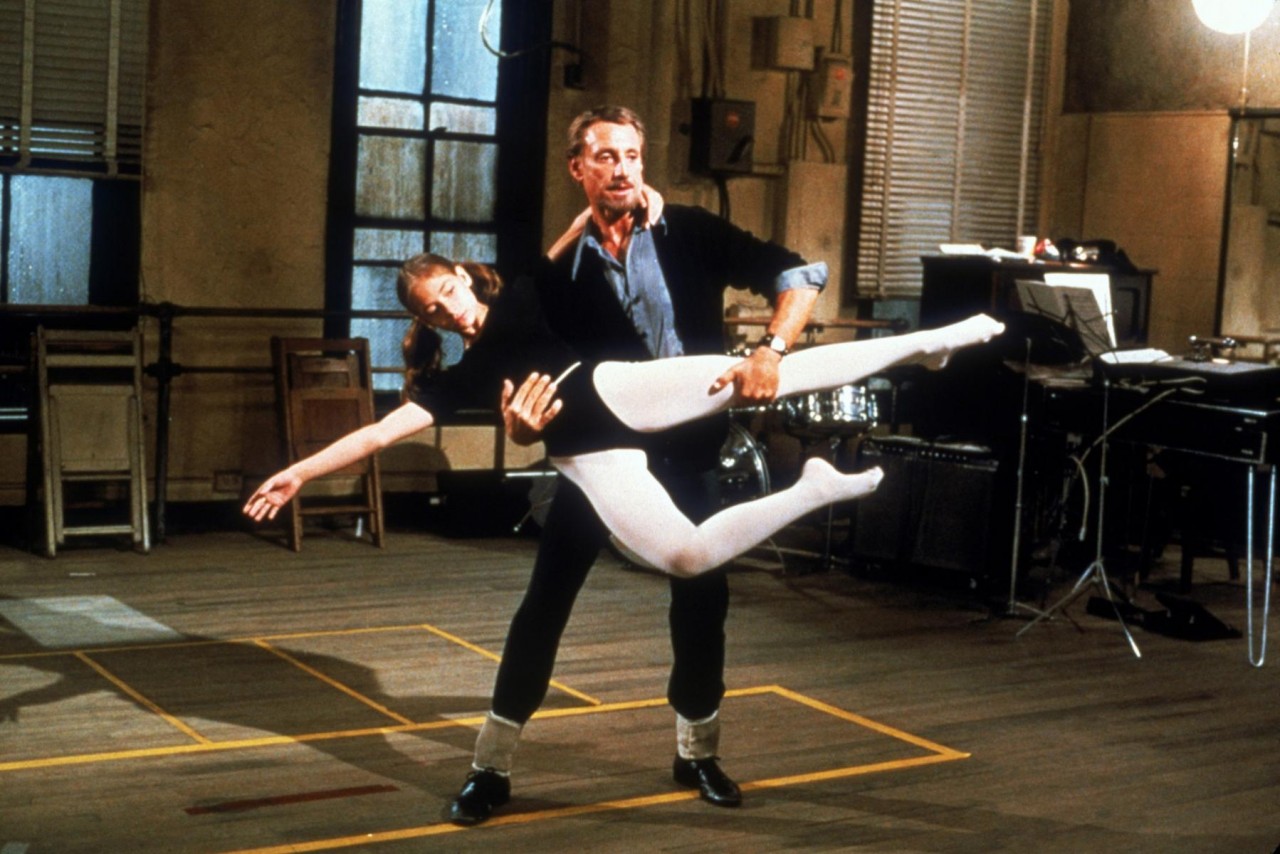 |
| Photo: 20th Century Fox |
Imdb score: 7.9/10
All That Jazz is a 1979 American musical drama film directed by Bob Fosse. The screenplay, by Robert Alan Aurthur and Fosse, is a semi-autobiographical fantasy based on aspects of Fosse's life and career as a dancer, choreographer and director. The film was inspired by Fosse's manic effort to edit his film Lenny while simultaneously staging the 1975 Broadway musical Chicago. It borrows its title from the Kander and Ebb tune "All That Jazz" in that production.
The film won the Palme d'Or at the 1980 Cannes Film Festival. At the 52nd Academy Awards it was nominated for nine Oscars, winning four: Best Original Score, Best Art Direction, Best Costume Design, and Best Film Editing.
In 2001, All That Jazz was deemed "culturally, historically, or aesthetically significant" by the United States Library of Congress and selected for preservation in the National Film Registry.
As of February 2021, All That Jazz has an 86% "Fresh" rating on review aggregation site Rotten Tomatoes based on 43 reviews, with an average rating of 7.6/10. The site's consensus stated: "Director Bob Fosse and star Roy Scheider are at the top of their games in this dazzling, self-aware stage drama about a death-obsessed director-choreographer."
In his review in The New York Times, Vincent Canby called the film "an uproarious display of brilliance, nerve, dance, maudlin confessions, inside jokes and, especially, ego" and "an essentially funny movie that seeks to operate on too many levels at the same time... some of it makes you wince, but a lot of it is great fun... A key to the success of the production is the performance of Roy Scheider as Joe Gideon... With an actor of less weight and intensity, All That Jazz might have evaporated as we watched it. Mr. Scheider's is a presence to reckon with."
Variety described it as "a self-important, egomaniacal, wonderfully choreographed, often compelling film" and added, "Roy Scheider gives a superb performance as Gideon, creating a character filled with nervous energy... The film's major flaw lies in its lack of real explanation of what, beyond ego, really motivates [him]."
TV Guide said, "The dancing is frenzied, the dialogue piercing, the photography superb, and the acting first-rate, with non-showman Scheider an illustrious example of casting against type . . . All That Jazz is great-looking but not easy to watch. Fosse's indulgent vision at times approaches sour self-loathing."
7. The Blues Brothers (1980)
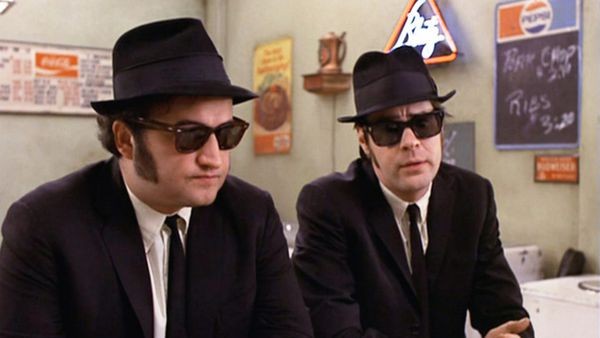 |
| Photo: Universal Pictures |
Imdb score: 7.9/10
No one makes films with cop cars flying through the air and crashing in mounds any more. Maybe CGI undermined the currency, or maybe modern auto design makes them more difficult to stack.
So there's an added nostalgic tinge to this rerelease of the epic comedy from 1980, crazy and cameo-rich in the Hollywood tradition of Mike Todd's Around the World in 80 Days, starring a slimline Dan Aykroyd and an alive John Belushi as the Butch-and-Sundance of white R&B. They are "Joliet" Jake and Elwood Blues, a couple of deadpan guys who dress in dark suits and sunglasses, trying to reform their band and earn enough money to save the Chicago orphanage where they were raised. "Are you the police?", asks a baffled boarding-house landlady with the unfamiliar-sounding name of Mrs Tarantino. (They mishear it as "Toronto".) "No, ma'am, we're musicians."
The mere spectacle of Elwood and Jake in their shades isn't quite as giggle-inducing as it presumably was back in 1980, but the stunts are still awe-inspiring, and there's plenty of laughs. They really were thinking big.
8. West Side Story (1961)
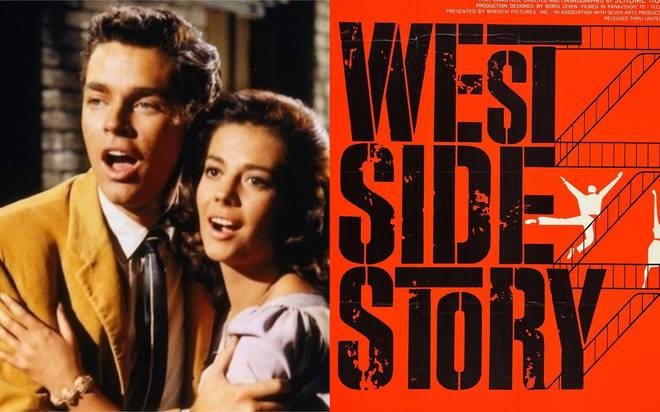 |
| Photo: Antioch on the Move |
Imdb score: 7.5/10
The Sondheim/Bernstein musical makes an important change to Romeo and Juliet. The Jets and the Sharks are not alike in dignity: the Jets are white and the Sharks are Puerto Ricans; a racist cop instinctively sides with the Jets, intending to sub-contract them for the job of ethnic-cleansing the New York West Side. Natalie Wood and Richard Beymer play the star-crossed lovers Maria and Tony; their relationship, and their singing, is a tiny bit insipid. The confrontation of the Jets' athletic Riff (Russ Tamblyn) and the Sharks' charismatic Bernardo (George Chakiris) is the real story here. Sondheim's lyrics for (I Like to Be In) America still snap, crackle and pop, though elsewhere, the cynicism looks a little dated. But there is one especially lovely moment. At their first meeting, lovestruck Tony asks Maria if her kindness to him is just a joke. She replies: "I have not yet learned to joke that way. Now I never will." This is a real big-screen event.
10. Fiddler On The Roof (1971)
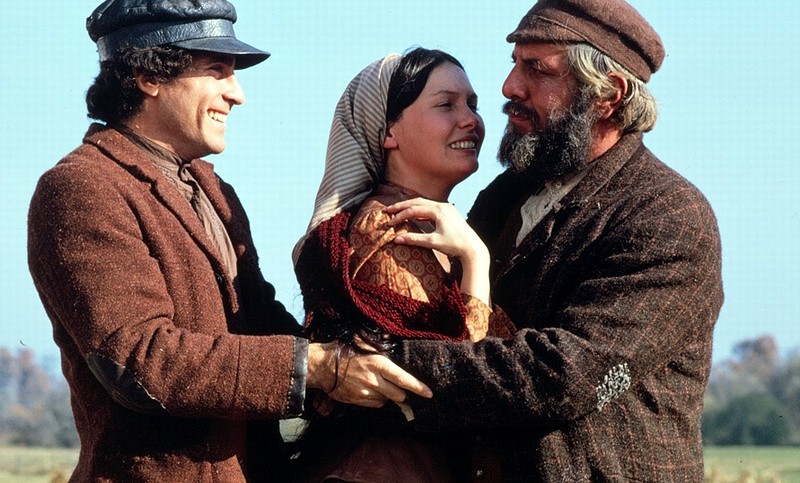 |
| Photo: United Artists |
Imdb score: 8/10
FIDDLER ON THE ROOF is an epic musical that is both a boisterous, comic look at rural life in a Ukrainian village, and a serious portrait of the sweeping, tragic changes the 1905 Russian Revolution forced on Russian Jews. The film centers on a humble agrarian family: milkman Tevye (Zero Mostel) is a devout Jew desperately attempting to hold onto his faith's traditions in the face of both the rebellious actions of his three marrying-age daughters and the increasingly ominous intimidation of Czarist officials. Fiddler starts off as a joyous trifle, with Tevye questioning his station in life in "If I Were a Rich Man," and his daughters wishing for ideal husbands in "Matchmaker." But the upbeat tone of the musical's first half makes the second half, which delves into the politics of the brewing Russian Revolution and introduces the terrible specter of exile and the Jewish diaspora, all the more disturbing.
It's the dichotomy of this film that makes it a daring, thought-provoking departure from traditional stage musicals. At the heart of Fiddler on the Roof is, of course, tradition; the title itself refers to the instability of life, against which tradition provides support. But this movie musical marks the ways in which such traditions are eroded, both for good (the viewer is presented with sympathetic portraits of Tevye's daughters and their unconventional choices of husbands), and decidedly bad (the pogrom that sweeps Anatevka's villagers from their homes is hauntingly realistic).
11. Cabaret (1972)
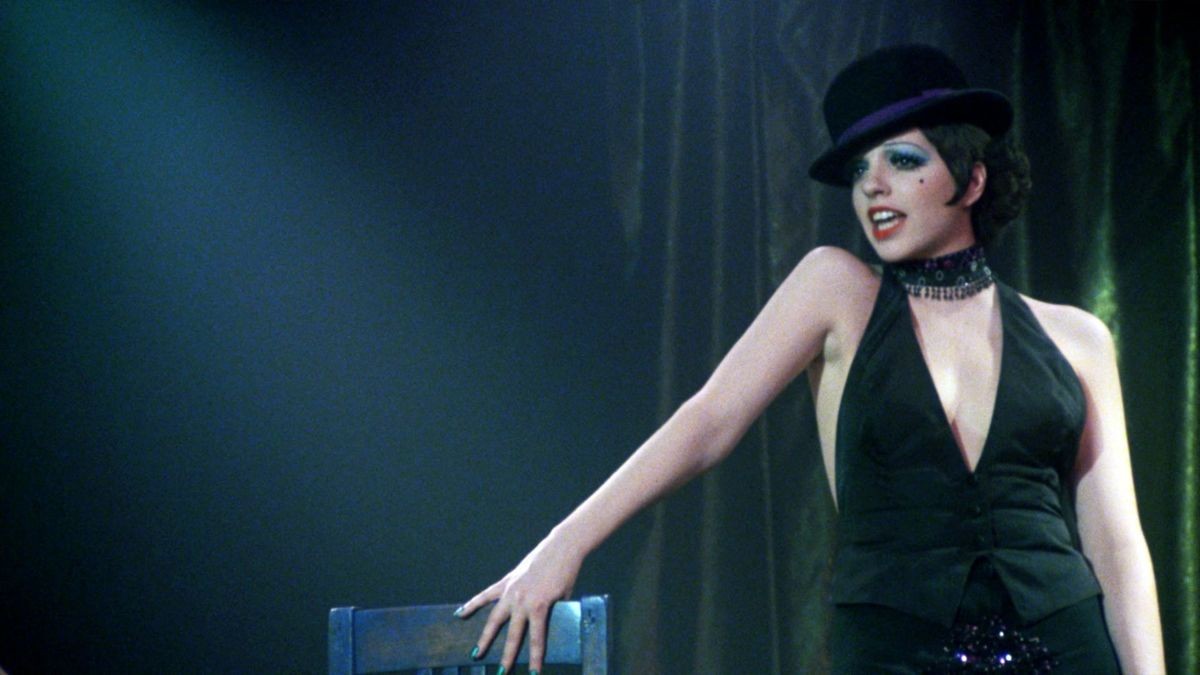 |
| Photo: Allied Artists |
Imdb score: 7.8/10
Berlin in the 1920s. American Chanteuse Sally Bowles has a fling with bisexual British writer Brian Roberts and tries to carve out a career as a gold-digger, putting the moves on a handsome aristocrat, while the ascendant Nazis put a crimp in their madcap lifestyle.
As Germany swings darkly through the inflationary 1920s and brownshirts take over the streets, Minnelli's emigre entertainer Sally Bowles waves her painted fingernails ('divine decadence') and does weird jazz with venomous MC Joel Grey.
Christopher Isherwood's autobiographical Berlin stories (previously filmed as I Am a Camera, with Julie Harris as Sally) were turned into a play and then a Broadway musical, and are here wrestled into movie shape by chreographer Bob Fosse, who contributes an incredible razzle‑dazzle which landed the film up to its rolled stockings in Oscars. It tries a little too hard to cross The Gold Diggers of 1933 with The Rise of the Third Reich to be comfortable, but stands as a hugely enjoyable, occasionally chilling, musical.
The terrific score by John Kander and Fred Ebb includes showstoppers like 'Cabaret', 'Money Makes the World Go Around', 'If You Could See Her Though My Eyes' and, as repopularised by Spitting Image's Margaret Thatcher in the late 1980s, the second most-famous Nazi anthem (after ‘Springtime for Hitler’) written by Jews, 'Tomorrow Belongs to Me'.
Few movie musicals since the Busby Berkeley days have managed so well the trick of presenting musical numbers as self-contained set-pieces - sketches rather than pop videos - that comment upon rather than advance the 'story'. Liza Minnelli, whose subsequent career was been spotty at best, gets her one great moment centre-screen in a Louise Brooks haircut and fabulous ‘20s fashions, while the face-painted, sing-song Grey is amazing as a cross between Leonard Sachs, David Bowie and Dracula.
12. Willy Wonka & the Chocolate Factory (1971)
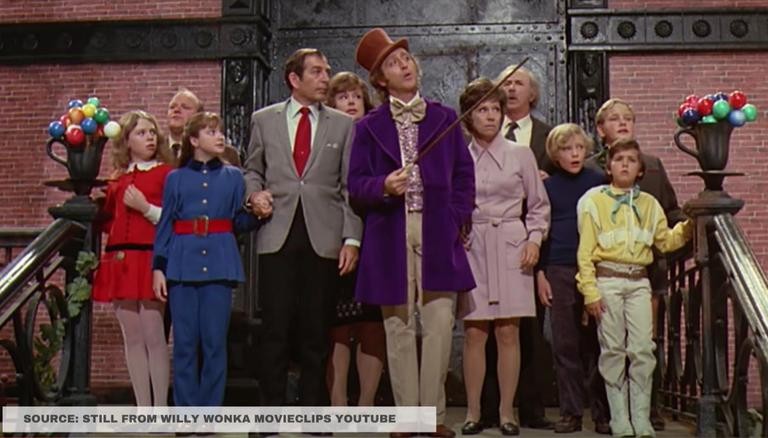 |
| Photo: Paramount Pictures |
Imdb score: 7.8/10
All of this is preface to a simple statement: “Willy Wonka and the Chocolate Factory” is probably the best film of its sort since "The Wizard of Oz." It is everything that family movies usually claim to be, but aren't: Delightful, funny, scary, exciting, and, most of all, a genuine work of imagination. “Willy Wonka” is such a surely and wonderfully spun fantasy that it works on all kinds of minds, and it is fascinating because, like all classic fantasy, it is fascinated with itself.
The story, like all good fantasies, is about a picaresque journey. Willy Wonka is the world's greatest chocolate manufacturer, and he distributes five golden passes good for a trip through his factory and a lifetime supply of chocolate. Each pass goes to a kid, who may bring an adult along, and our hero Charlie (a poor but honest newsboy who supports four grandparents and his mother) wins the last one.
The other four kids are hateful in one way or another, and come to dreadful ends. One falls into the chocolate lake and is whisked into the bowels of the factory. He shouldn't have been a pig. Another is vain enough to try Wonka's new teleportation invention, and winds up six inches tall -- but the taffy-pulling machine will soon have him back to size, right? If these fates seem a little gruesome to you, reflect that all great children's tales are a little gruesome, from the Brothers Grimm to Alice in Wonderland to Snow White, and certainly not excluding Mother Goose. Kids are not sugar and spice, not very often, and they appreciate the poetic justice when a bad kid gets what's coming to him.
13. The Wizard Of Oz (1939)
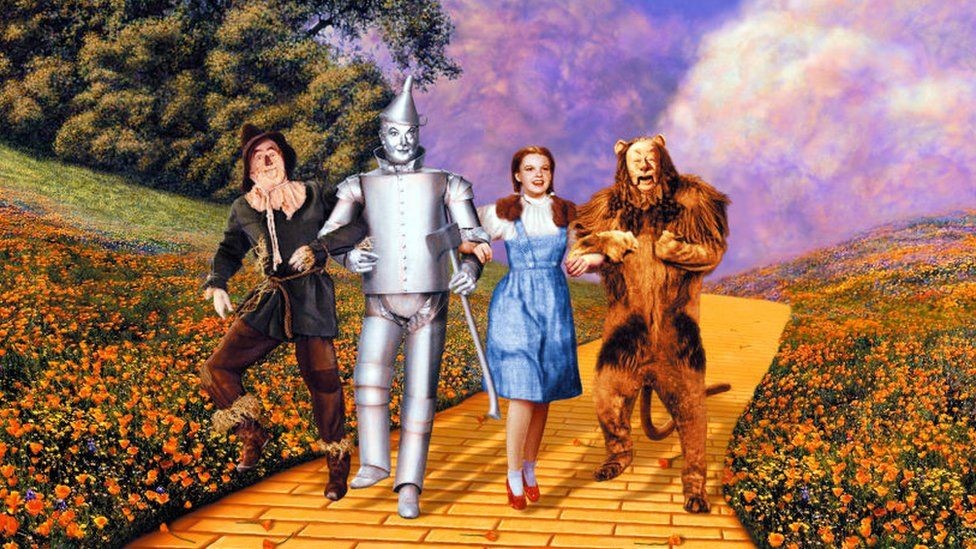 |
| Photo: Getty Images |
Imdb score: 8/10
The Wizard of Oz is a 1939 American musical fantasy film produced by Metro-Goldwyn-Mayer. An adaptation of L. Frank Baum's 1900 children's fantasy novel The Wonderful Wizard of Oz, the film was primarily directed by Victor Fleming (who left the production to take over the troubled Gone with the Wind), and stars Judy Garland, Frank Morgan, Ray Bolger, Bert Lahr, Jack Haley, Billie Burke and Margaret Hamilton. Noel Langley, Florence Ryerson, and Edgar Allan Woolf received credit for the screenplay, but others made uncredited contributions. The songs were written by Edgar "Yip" Harburg and composed by Harold Arlen. The musical score and incidental music were composed by Herbert Stothart.
Characterized by its use of Technicolor, fantasy storytelling, musical score, and memorable characters, The Wizard of Oz was moderately successful upon its original release of August 25, 1939. The film was considered a critical success and was nominated for six Academy Awards, including Best Picture, winning in two categories: Best Original Song for "Over the Rainbow" and Best Original Score by Stothart. While the film was sufficiently popular at the box office, it failed to make a profit for MGM until the 1949 re-release, earning only $3,017,000 on a $2,777,000 budget, not including promotional costs, which made it MGM's most expensive production at that time.
The 1956 television broadcast premiere of the film on the CBS network reintroduced the film to the public; according to the Library of Congress, it is the most seen film in movie history. In 1989, it was selected by the U.S. Library of Congress as one of the first 25 films for preservation in the National Film Registry for being "culturally, historically, or aesthetically significant". It is also one of the few films on UNESCO's Memory of the World Register. It was among the top ten in the 2005 BFI (British Film Institute) list of "50 films to be seen by the age of 14", and is on the BFI's updated list of "50 films to be seen by the age of 15" released in May 2020.
14. Singin' In The Rain (1952)
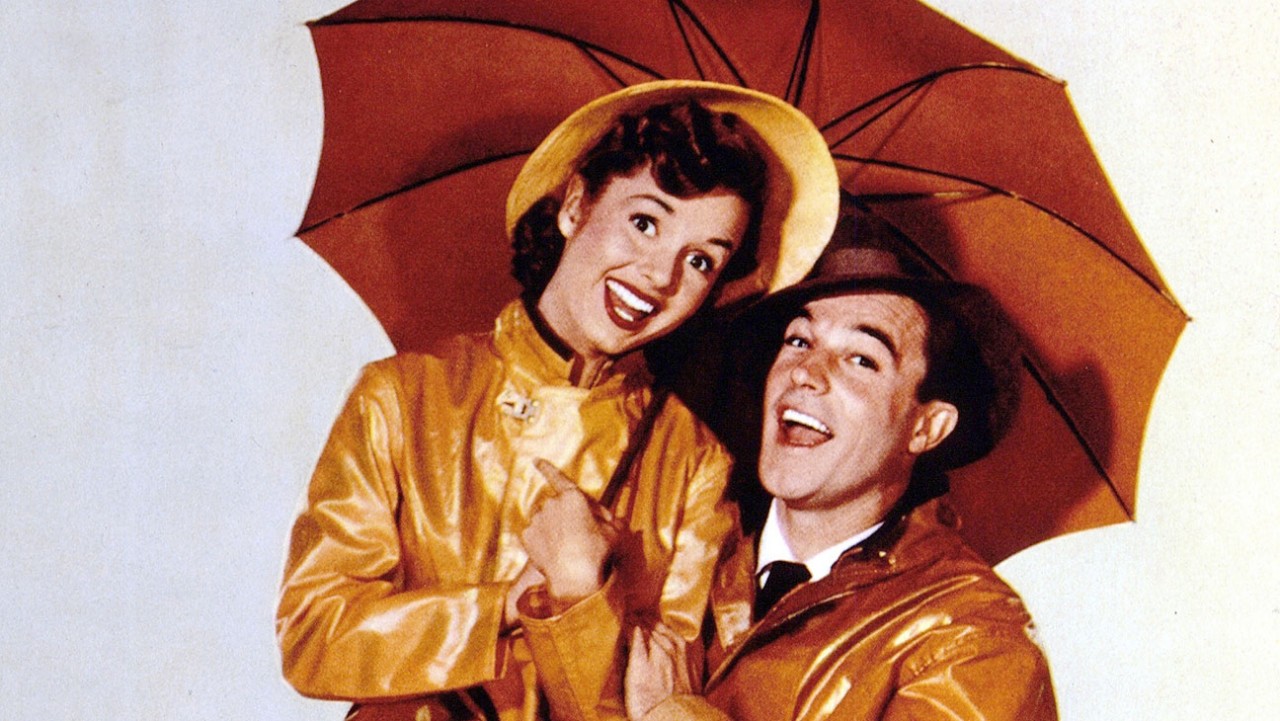 |
| Photo: Metro-Goldwyn-Mayer |
Imdb score: 8.3/10
With muscular frankness and grace, Kelly stars (and with Stanley Donen co-directs) playing the easy-going, smiley star in the 1920s routinely paired with a conceited female lead he can’t abide: Lina Lamont (a terrific and underappreciated comic performance by Jean Hagen). His best pal is musical director Cosmo, a stunning performance of almost extraterrestrial comic agility by O’Connor. Don falls hard for gutsy and talented Kathy at the moment when the silent cinema is rendered obsolete, and gets Kathy a job dubbing squeaky-voiced Lina. But they have an even bigger idea: why not put music into these newfangled talking pictures? And so the musical is born. They have created a new stylised convention (bursting into song with music coming from nowhere) to replace the old convention of silent movies, and this has saved the whole seventh art.
The unstoppable joy of the musical numbers, especially with O’Connor, is what never fails to seduce – perhaps especially in Moses Supposes. A pompous schoolteacherly fellow tries to instruct Don how enunciate his vowels and consonants; Cosmo shows up, and soon they have disrupted the entire thing with an anarchic dance number. The prissy business of correct elocution couldn’t be less relevant. The songs themselves often float surreally free of the story, or subtextually provide the joins. In Good Morning (celebrating their all-night conversation in which the genre of movie musical has been invented), Kathy, Cosmo and Don prophetically pick up rain macs, anticipating the legendary number to come.
15. The Nightmare Before Christmas (1993)
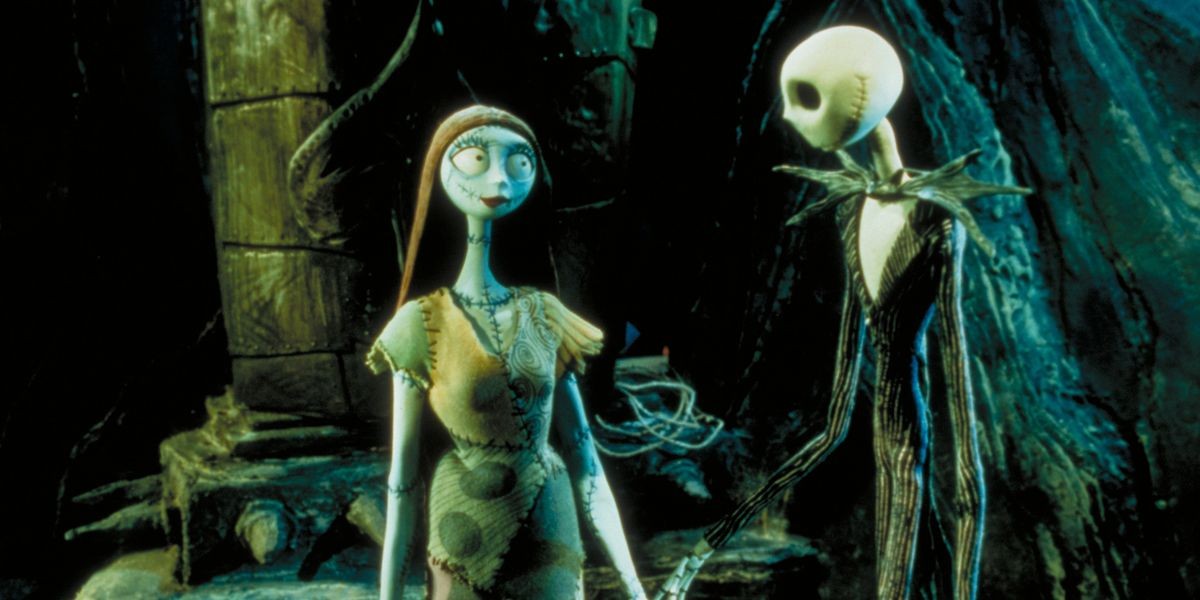 |
| Photo: Buena Vista Pictures |
Imdb score: 8/10
Tim Burton’s Nightmare Before Christmas restores originality and daring to the Halloween genre. This dazzling mix of fun and fright also explodes the notion that animation is kid stuff. The history-making stop-motion animation in this $20 million charmer transcends age. It’s 74 minutes of timeless movie magic.
The story concerns Jack Skellington, the Pumpkin King of dreary Halloweentown, who finds a secret passageway to Christmastown. Enchanted by the colors and high spirits, Jack decides to sandbag Santa and deliver presents in a coffin-shaped sleigh led by skeleton reindeer. Burton hatched the idea 11 years ago as a humble animator at Disney, a Conservativetown where such deviltry was quickly squashed. His later success with Batman, Beetlejuice and the like prompted a reconsideration.
Nightmare celebrates the joy of a good scare; it also deals with the repercussions of being misunderstood. There’s not a trace of podlike conformity in Burton’s vision, Elfman’s score or Caroline Thompson’s script. And director Henry Selick (he did the ingenious MTV logo animation) performs miracles in stop-motion; Nightmare took nearly three years to complete (over 100 crew members averaged only 60 seconds of film per week). The result has the earmarks of an enduring classic. Of all the new Halloween films, only this one has the power to truly haunt our dreams.
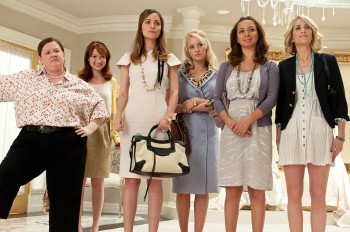 | Top 15 Best Chick Flicks Of All Time Chick flicks can be beautiful rom-coms, messy dramas, empowering stories—or sometimes all three at the same time to spice up your girl nights with besties. |
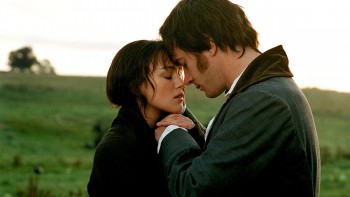 | 15 Best Movies Based on Books of All Time There are a lot of movies based on books but only a few ones worth watching. Below you'll find some of the best book-to-movie adaptions ... |
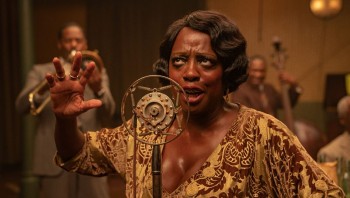 | Top 15 Best Oscar Winning Movies on Netflix If you're looking to expand your knowledge of prestigious, award-winning films, Netflix has some great options for you to watch right now. |
Recommended
 Handbook
Handbook
Vietnam Moves Up 8 Places In World Happiness Index
 Handbook
Handbook
Travelling Vietnam Through French Artist's Children Book
 Multimedia
Multimedia
Vietnamese Turmeric Fish among Best Asian Dishes: TasteAtlas
 Handbook
Handbook
From Lost to Found: German Tourist Thanks Vietnamese Police for Returning His Bag
Popular article
 Handbook
Handbook
Prediction and Resolution for the Disasters of Humanity
 Handbook
Handbook
16 French Films To Be Shown For Free During Tet Holiday In Vietnam
 Handbook
Handbook
Unique Cultural and Religious Activities to Welcome Year of the Snake
 Handbook
Handbook







